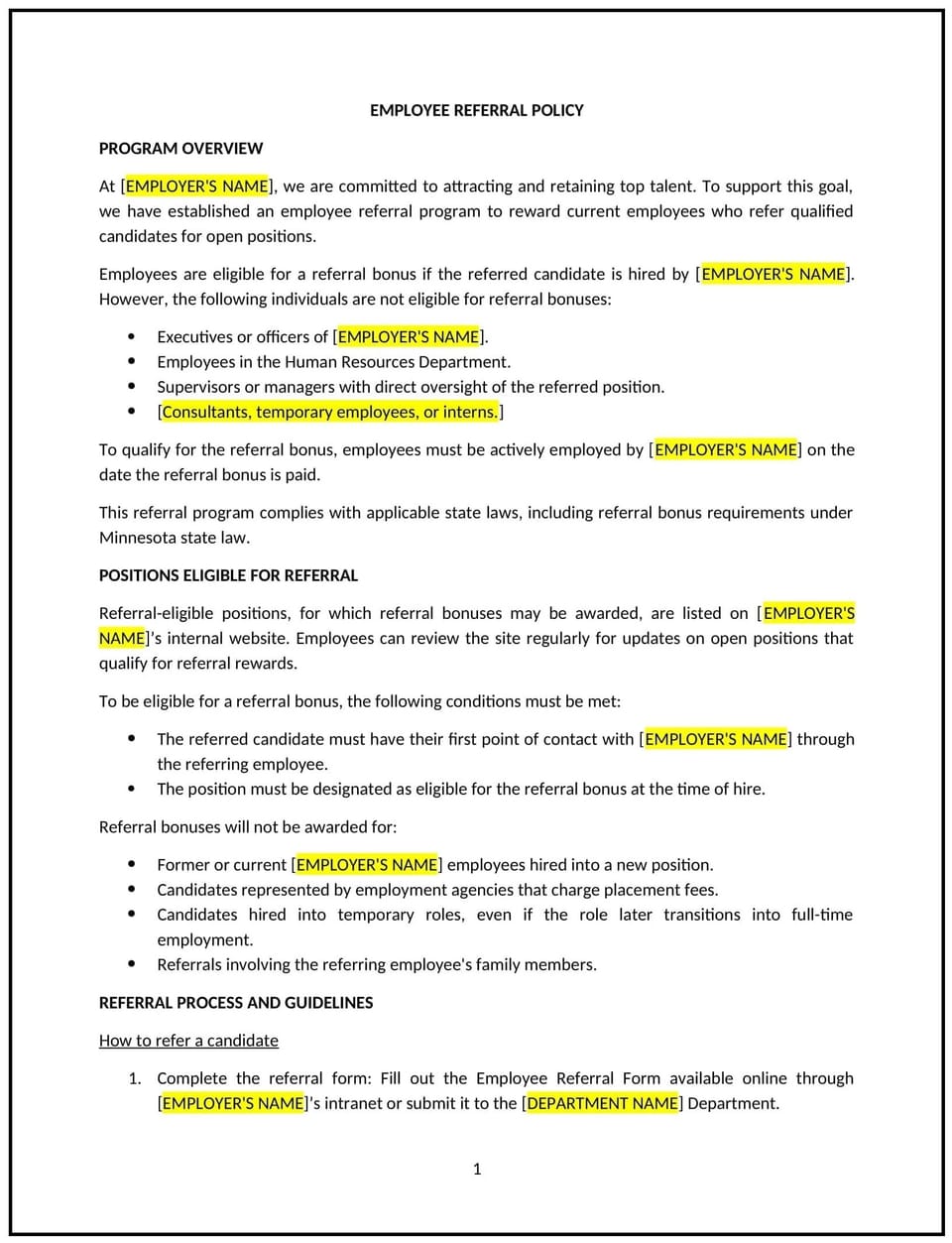Employee referral policy (Minnesota): Free template

Employee referral policy (Minnesota)
This employee referral policy is designed to help Minnesota businesses develop and implement a formal program for encouraging employees to refer qualified candidates for open positions. It outlines the process for submitting referrals, the rewards or incentives offered to employees for successful referrals, and the eligibility criteria for both the referrer and the referred candidate.
By implementing this policy, businesses can leverage their existing workforce to find high-quality candidates, reduce recruitment costs, and foster a sense of employee involvement in the hiring process.
How to use this employee referral policy (Minnesota)
- Define referral process: Clearly outline the steps employees should take to submit referrals, including how and where to submit candidate information, and any required forms or documentation.
- Set eligibility criteria: Specify the eligibility requirements for both the employee making the referral and the candidate being referred, such as the type of positions eligible for referrals and the minimum qualifications for candidates.
- Establish reward/incentive structure: Outline the rewards or incentives employees will receive for successful referrals, whether monetary, gift cards, additional PTO, or other benefits.
- Clarify referral terms: Define what constitutes a “successful referral,” including guidelines on when the employee will receive the reward (e.g., after the candidate completes probation or remains employed for a certain period).
- Communicate transparency: Ensure that employees understand how the referral process works, how candidates are evaluated, and the timeline for receiving rewards.
- Prevent conflicts of interest: Address any potential conflicts of interest, such as ensuring referrals are based on merit and not personal bias, and outline any restrictions on referring family members or close relatives.
Benefits of using an employee referral policy (Minnesota)
Implementing this policy provides several advantages for Minnesota businesses:
- Reduces recruitment costs: Referral programs can be a cost-effective way to fill job openings without the need for expensive job postings or recruitment agency fees.
- Attracts high-quality candidates: Employees are more likely to refer candidates who they believe are qualified and will fit well within the company, leading to better hires.
- Improves retention: Employees who refer candidates are often more committed to the hiring process, leading to better alignment between the referred employee and the company culture.
- Enhances employee engagement: Employee referral programs encourage staff to participate in the hiring process and feel invested in the company’s growth.
- Reflects Minnesota-specific considerations: Adapts the policy to align with local labor market trends and community values, encouraging employee participation in Minnesota’s workforce development initiatives.
Tips for using this employee referral policy (Minnesota)
- Communicate clearly: Ensure that all employees are aware of the referral program, including how to participate, the types of positions available for referral, and the rewards or incentives they can earn.
- Offer incentives that motivate: Design the reward system to be attractive to employees, such as offering meaningful incentives like cash bonuses, extra paid time off, or other perks that align with employee preferences.
- Promote the program: Regularly remind employees about the referral program through internal communication channels like emails, newsletters, or meetings to maintain engagement.
- Track referrals and reward success: Set up a system to track referral submissions, candidates' progress, and reward distribution to ensure a smooth process and timely recognition.
- Address fairness and transparency: Ensure the process is transparent by providing feedback to employees who refer candidates and ensuring that referrals are evaluated based on qualifications and merit.
Q: How do I submit a referral?
A: Employees should submit referrals by completing the designated referral form or email template and providing the candidate’s resume and any additional relevant information to HR or the hiring manager.
Q: What types of positions are eligible for referrals?
A: Businesses should specify which roles are eligible for referral, typically focusing on hard-to-fill positions, high-demand roles, or positions that align with the company’s long-term goals.
Q: What rewards do employees receive for successful referrals?
A: Rewards may vary based on the company’s policy but often include monetary incentives, gift cards, or additional time off. The reward is typically given after the referred candidate has successfully completed a set probationary period.
Q: Can I refer a family member or close relative?
A: Businesses should outline any restrictions on referring family members or close relatives to avoid conflicts of interest and ensure that all referrals are based on merit and suitability for the role.
Q: How long will it take for employees to receive their referral reward?
A: Businesses should clarify the timeline for when rewards are given, which is typically after the referred candidate has been employed for a set period, such as 90 days or after successfully passing their probation period.
Q: Are there limits on how many candidates I can refer?
A: While most companies encourage unlimited referrals, businesses may set guidelines on the number of referrals an employee can submit for a particular position, to ensure that all candidates are thoroughly vetted.
Q: How can I check the status of my referral?
A: Businesses should provide employees with a way to track the status of their referral, such as through updates from HR or the hiring manager on the candidate’s progress in the interview process.
Q: How often should this policy be reviewed?
A: The policy should be reviewed annually or whenever there are significant changes to the company’s hiring practices, job openings, or employee incentive programs.
This article contains general legal information and does not contain legal advice. Cobrief is not a law firm or a substitute for an attorney or law firm. The law is complex and changes often. For legal advice, please ask a lawyer.


